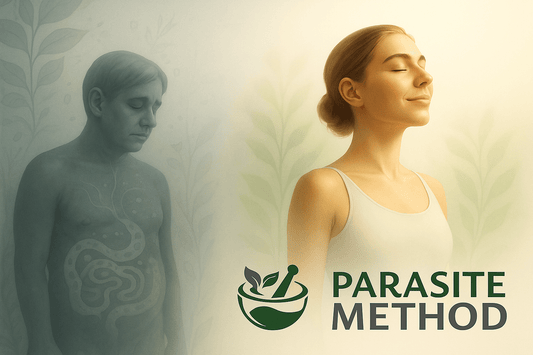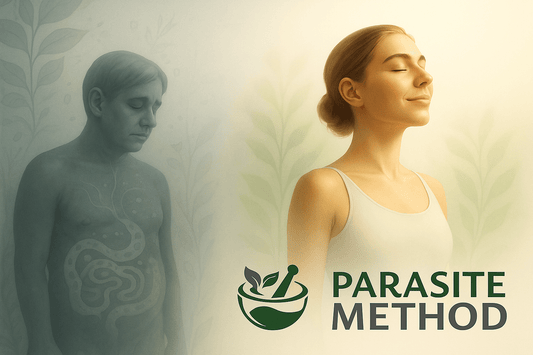Ever have those days... or weeks... or even months... where you just feel off? You’re tired for no reason, your digestion is a mess, your skin is acting up, and your brain feels like it’s wading through fog. You’ve tried changing your diet, getting more sleep, and maybe you've even seen a doctor who told you "everything looks normal." It’s a frustrating, isolating experience that can leave you questioning your own body.
What if the Source is something you’ve never even considered? The topic of parasites can feel uncomfortable or like something that only happens in faraway places. But the truth is, these microscopic invaders are far more common in our modern world than we think, and they could be the hidden root cause behind a host of chronic, unexplained health issues. This guide is here to cut through the confusion with clear, evidence-based information, helping you connect the dots and take back control of your health.
An Unseen Problem in Our Modern World
The idea that parasitic infections are a relic of the past or a problem for developing nations is a dangerous myth. The World Health Organization estimates that over 1.5 billion people, or about 24% of the global population, are infected with intestinal parasites. And while prevalence is higher in areas with poor sanitation, our modern lifestyles have opened up new pathways for exposure right here at home.
In fact, in developed countries like the United States, protozoal (single-celled) infections are more common than worm-based ones. Think about our daily lives:
-
Adventurous Diets: The rise of global cuisine means we’re eating more raw and undercooked foods. That delicious sushi, ceviche, or poke bowl could be a source of parasites. Even "healthy" raw vegetables can be contaminated if they're washed with compromised water or grown in contaminated soil.
-
Our Furry Friends: We love our pets, but young animals like puppies and kittens are common carriers of roundworms and hookworms that can be passed to us.
-
Travel and Recreation: International travel exposes us to new environments and new risks. Closer to home, even a dip in a swimming pool isn't without risk, as chlorine-resistant parasites like Cryptosporidium are a leading cause of recreational water illnesses.
The most common intestinal parasite in the U.S. is Giardia, and the most common parasitic worm is the pinworm. The risk isn't just theoretical; it's woven into the fabric of our modern lives.
The Top 10 Hidden Signs of a Parasitic Imbalance
One of the biggest challenges with identifying a parasitic infection is that the symptoms are often vague and can be easily blamed on stress, aging, or a poor diet. These invaders don't just cause an upset stomach; they can create systemic issues by stealing nutrients, releasing inflammatory toxins, and putting your immune system on high alert. Here are ten of the most common "hidden" symptoms you shouldn't ignore:
-
Chronic Fatigue & Exhaustion: This isn't just feeling tired. It's a deep, persistent exhaustion that sleep doesn't fix. It can be caused by parasites stealing the vital nutrients your body needs or by the immense energy your immune system expends trying to fight them off. Certain parasites, like Giardia, are even directly linked to chronic fatigue syndrome
-
Unexplained Digestive Issues: This is the most classic sign. If you constantly struggle with bloating, gas, diarrhea, constipation, or symptoms that feel like IBS, it could be a sign that parasites have taken root in your GI tract.
-
Brain Fog & Mood Swings: Do you struggle with concentration, memory, or feel uncharacteristically anxious or irritable? Parasites release toxins that can cross into your bloodstream, interacting with your neurotransmitters and creating feelings of anxiety, mood swings, and mental slowness.
-
Skin Irritation, Rashes, Hives, or Eczema: Your skin is often a window to your gut health. Intestinal parasites can stimulate the production of Immunoglobulin E (IgE), the antibodies associated with allergic reactions, leading to unexplained skin issues
-
Teeth Grinding (Bruxism): Many people are surprised by this one. Grinding your teeth in your sleep is often linked to the anxiety and nervous system irritation caused by the toxins released by parasites.
-
Insomnia or Restless Sleep: Waking up frequently during the night or having trouble falling asleep can be a sign of parasitic activity. This can be due to the physical discomfort they cause or their nocturnal cycles, such as pinworms laying eggs, which causes intense itching and disrupts sleep.
-
Aching Joints and Muscles: If you have persistent muscle and joint pain that isn't from a workout, it could be a sign of inflammation. Some parasites can invade joint spaces and soft tissues, releasing inflammatory toxins that mimic arthritis.
-
Iron-Deficiency Anemia: Some parasites, like hookworms, literally feed on your red blood cells, leading to a loss of iron. If you're anemic and can't figure out why, it's worth investigating a potential parasitic cause.
-
Never Feeling Full or Satisfied: Tapeworms are notorious for this. They live in your gut and consume the food you eat, leaving you feeling hungry even after a full meal. This can sometimes be accompanied by unexplained weight loss.
-
Anal or Vaginal Itching: This is a hallmark symptom of pinworms, the most common worm infection in the U.S. The itching is often worse at night and can be a key indicator that you're dealing with an infection.

Why Your Doctor Might Miss It: The Diagnostic Gap
If you've gone to a doctor with a list of these symptoms and been told "everything is fine," you are not imagining things, and you are certainly not alone. There is a well-documented "diagnostic gap" when it comes to identifying chronic, low-grade parasitic infections. In fact, these illnesses are often overlooked because their subtle symptoms overlap with so many other conditions. One expert even stated that, historically, "Parasitology is the preserve of the diagnostically destitute," referring to how often it's missed as a root cause of complex illness.
The standard conventional test is the Ova & Parasite (O&P) stool test, which involves a technician looking for parasite eggs under a microscope. Unfortunately, this method is often described as "notoriously unreliable". Here’s why:
-
Intermittent Shedding: Parasites have complex life cycles and don't release their eggs into your stool every single day. This means you can have an active infection, but if you provide a sample on an "off" day, the test will come back with a false negative. Even collecting multiple samples doesn't eliminate this fundamental issue.
-
Detection Challenges: Some parasites are simply hard to spot. For example, Giardia often results in false negatives because its presence in stool can be unusual, and some parasites even have self-dissolving mechanisms that make them virtually undetectable with standard microscopy.
-
A Focus on Acute Illness: The conventional system is primarily designed to find the cause of acute, severe illness. If you don't have raging diarrhea, a parasite test may not even be considered, and your chronic fatigue or skin rash will be attributed to something else.
Functional medicine takes a different approach by aiming to identify the root cause of disease rather than just managing symptoms. Practitioners often use more advanced testing, such as comprehensive stool analysis that uses PCR (DNA) technology to identify the genetic material of parasites. This is far more sensitive and doesn't depend on catching a live organism or intact egg in a single sample. These advanced tests also provide a bigger picture of your gut health, looking at levels of beneficial bacteria and inflammatory markers, giving a more complete view of what's really going on.

The Emotional Toll of the Unknown
Living with a collection of chronic, unexplained symptoms is more than just a physical burden—it's profoundly exhausting on a mental and emotional level. The cycle of visiting doctors, running tests, and being told that "everything is normal" can make you feel dismissed and unheard. When you know something is wrong in your body but can't get a diagnosis, it's easy to start questioning your own sanity.
This feeling of being lost in the medical system, where the focus is often on treating individual symptoms rather than finding a single root cause, is incredibly frustrating. It's a lonely journey. Acknowledging that your symptoms are real and that there might be a valid reason they've been missed by standard tests is the first, most powerful step toward reclaiming your health and finding real answers.
How to Start Getting Answers
The journey back to clarity begins with knowledge and empowerment. By understanding the full spectrum of symptoms and recognizing that they might be connected to a single root cause, you can start to advocate for yourself in a new way.
The crucial next step is to understand that better tools exist. If you suspect a hidden gut issue is sabotaging your health, the answer may not be to repeat the same tests that have already come back normal. Instead, it's about seeking out a different approach. A functional medicine practitioner, for example, is trained to look for these underlying causes and utilizes more comprehensive testing to get a clearer picture of your gut health.
While this guide provides a strong foundation, many people find it helpful to use a structured tool to organize their thoughts before seeking help. If these symptoms are hitting close to home, a great next step is to Take the Parasite Quiz. It’s not a diagnostic tool, but it can help you consolidate your symptoms and gain clarity on whether a comprehensive, supportive protocol is a logical next step for you.
A Smarter Path Forward
A truly effective approach to restoring balance in the body is more than just taking a few herbs. It's a strategic, multi-phase process that supports your body's innate healing intelligence. A well-designed protocol often begins by supporting the body's natural drainage pathways, the liver, kidneys, and bowels, to ensure they are ready to handle the removal of toxins. Only then does it move on to using targeted botanicals, followed by steps to heal the gut lining and restore a healthy microbiome for long-term resilience.
This is the philosophy that powers The Parasite Method. It’s a comprehensive system designed to work with your body, moving beyond simplistic "cleanses" to offer a complete, logical protocol that supports you every step of the way.
Final Thoughts
Feeling unwell without knowing why is a heavy burden to carry. But you are not powerless. By arming yourself with knowledge, you can become your own best health advocate and take informed, empowered action. The evidence is clear: parasites are a relevant health topic in our modern world, and their symptoms are often hidden in plain sight.
We encourage you to continue learning and listening to your body. When you're ready to take the next step on your health journey, start with our free quiz.

 MR DROPIFY
MR DROPIFY



